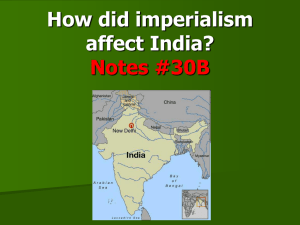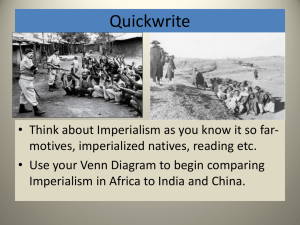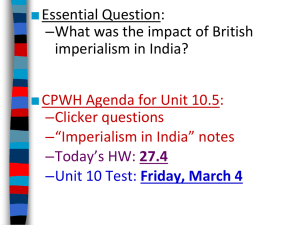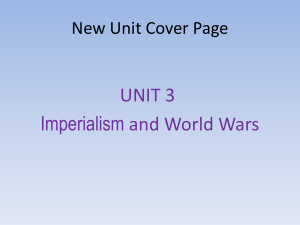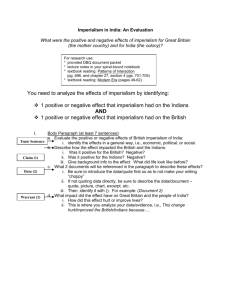Imperialism in India Packet #17 S. Gerhardt Global II Do Now: Take
advertisement
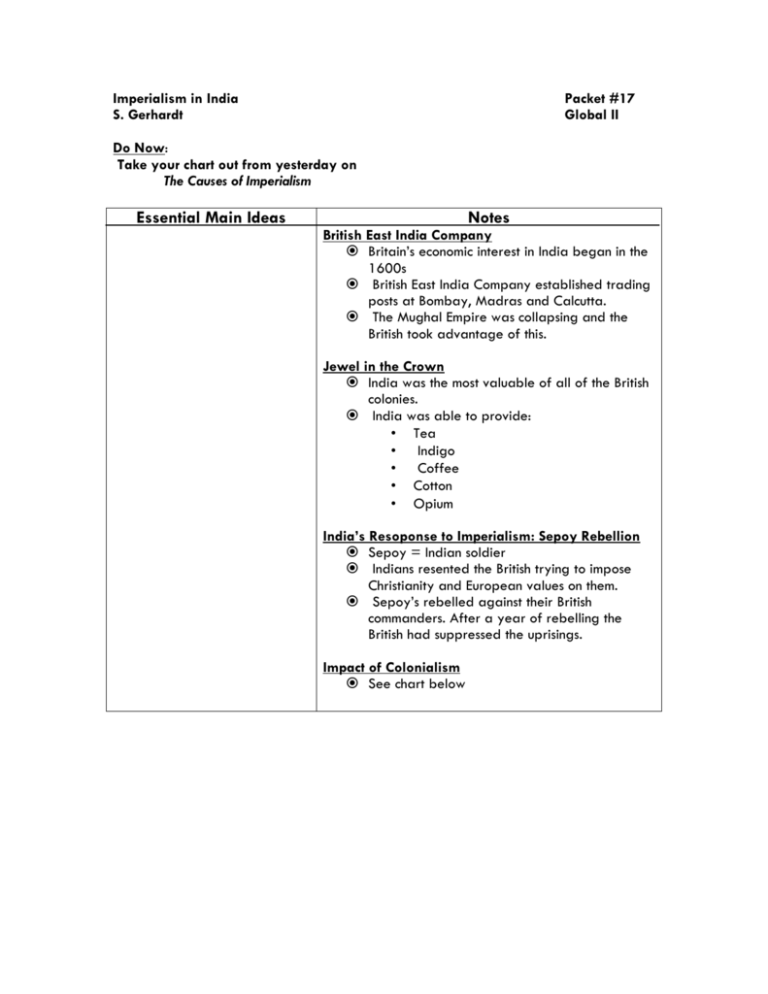
Imperialism in India S. Gerhardt Packet #17 Global II Do Now: Take your chart out from yesterday on The Causes of Imperialism Essential Main Ideas Notes British East India Company Britain’s economic interest in India began in the 1600s British East India Company established trading posts at Bombay, Madras and Calcutta. The Mughal Empire was collapsing and the British took advantage of this. Jewel in the Crown India was the most valuable of all of the British colonies. India was able to provide: • Tea • Indigo • Coffee • Cotton • Opium India’s Resoponse to Imperialism: Sepoy Rebellion Sepoy = Indian soldier Indians resented the British trying to impose Christianity and European values on them. Sepoy’s rebelled against their British commanders. After a year of rebelling the British had suppressed the uprisings. Impact of Colonialism See chart below “During the 1700s, the Mogul [Mughal] Empire in India became weaker and weaker. At the same time, the British and the French East India trading companies gained strength. They competed for control of India. The major aim of Britain’s East India Company was to profit from selling Indian cotton cloth, silk, and sugar to other countries. Victory over France in the Seven Years’ War (1756 – 1763) left Britain the major power in India. (This was called the French and Indian War in North America.) The portions of India not governed directly by Britain were ruled by Indian princes. These local leaders eventually signed treaties that placed their states under British protection. With some restrictions placed on it by the British government, the East India Company ruled India until 1857. The company built telegraph, railroad, and irrigation systems there. In addition, it set up a postal service and a number of schools. The company also organized a large army of Indian soldiers, called Sepoys, to defend its interests and India’s borders. The Sepoys were commanded by British officers and were supported by units of the British Army. Missionaries arrived to teach Hindus and Muslims about Christianity.” ~ Global History (Courtesy of Ms. Napp) Main Ideas: 1. __________________________________________________________________ __________________________________________________________________ 2. __________________________________________________________________ __________________________________________________________________ 3. __________________________________________________________________ __________________________________________________________________ Questions for Comprehension: 1. __________________________________________________________________ Answer: 2. __________________________________________________________________ Answer: 3. __________________________________________________________________ Answer: Effects of British Imperialism on India Positive Effects The British built the world’s third largest railroad network in India Railroads and telegraphs united the subcontinent The British developed a modern road network and built dams and irrigation canals Sanitation and public health improved Negative Effects The British restricted Indian-owned industries such as cotton textiles The British emphasis on cash crops resulted in a loss of self-sufficiency for many villagers Famines increased as cash crops reduced food production Indians faced discrimination from the British in their own land Ultimately, the British wanted India’s resources for its factories. Indian resources were exported to Great Britain and converted into manufactured goods that were sold throughout the world. Of course, manufactured goods were more profitable than raw materials. As such, India exported cheaper resources and was forced to import expensive manufactured goods. By not allowing Indian industries to compete, the subcontinent experienced great poverty. The Indian people suffered as India became an exporter of cash crops and an importer of more expensive finished goods. (Courtesy of Ms. Napp) Directions: After examining the chart above, do you believe the British occupation of India was justified (acceptable). Take a position below and write your answer in complete sentences. ________________________________________________________________________ ________________________________________________________________________ ________________________________________________________________________ ________________________________________________________________________ ________________________________________________________________________ ________________________________________________________________________ ________________________________________________________________________ ________________________________________________________________________ ________________________________________________________________________ WRAP-UP & REVIEW: Review your notes and write sentences using the letters provided below. R I W Wrap-Up & Review: Document #1 The resolution of the All-African People’s Conference, held in Accra, Ghana in 1958, “condemns colonialism and imperialism” based on these premises. Whereas all African peoples . . . deplore the economic exploitation of African people by Imperialist Countries, thus reducing Africans to poverty in the midst of plenty . . . Whereas fundamental human rights, freedom of speech, freedom of association, freedom of movement, freedom of worship, freedom to live a full and abundant life . . . are denied to Africans through the activities of Imperialists. What are the reasons this group condemned imperialism? _____________________________________________________________________________ _____________________________________________________________________________ _____________________________________________________________________________ Document #2 This is an African proverb. When the whites came to our country, we had the land and they had the Bible; now we have the Bible and they have the land. What does proverb imply about the negative effect of imperialism in Africa? _______________________________________________________________________ _______________________________________________________________________ _______________________________________________________________________ Document #3 This poem by David Diop is from an Anthology of West African Verse. The White Man killed my father, My brother was strong. My father was proud. His hand red with black blood The White Man seduced my mother, The White Man turned to me; My mother was beautiful. And in the Conqueror’s voice said, The White Man burnt my brother “Boy! A chair, a napkin, a drink.” Beneath the noonday sun What negative aspects of imperialism does Diop present in this poem? _____________________________________________________________________________ _____________________________________________________________________________ _____________________________________________________________________________ Document #4 Sekou Toure, and African nationalist, pointed out another negative aspect of imperialism. Colonialism’s greatest misdeed was to have tried to strip us of our responsibility in conducting our own affairs and convince us that our civilization was nothing less than savagery, thus giving us complexes which led to our being branded as irresponsible and lacking in self-confidence. What criticism does Toure offer about imperialism? _____________________________________________________________________________ _____________________________________________________________________________ _____________________________________________________________________________ Document #5 George H.T. Kimble, in a 1962 New York Times Magazine article, “Colonialism: the Good, the Bad, the Lessons,” gives his point of view. . . . they [the colonial powers] failed to provide the African with sufficient [preparation] . . . None of the newly independent countries had enough skilled African administrators to run their own . . . [or] enough African technicians to keep the public utilities working. . . . And no country had an electorate that knew what independence was all about. . . . For all its faults, colonial government provided security of person and property in lands that had known little or either. . . . It was the colonial powers who were largely responsible for the opening of the region to the lumberman, miner, planter, and other men of means without whom its wealth would be continued to lie fallow [uncultivated].] 1. What does this author cite as negative effects of imperialism? _______________________________________________________________________ _______________________________________________________________________ _______________________________________________________________________ 2. What does this author cite as positive effects if imperialism? _______________________________________________________________________ _______________________________________________________________________ _______________________________________________________________________ DIRECTIONS: On the lines below write the introductory paragraph for this essay and ONE body paragraph citing the NEGATIVE impact imperialism had on Africa. **Don’t forget to: ** 1. Cite your document 2. Summarize the document in YOUR OWN WORDS! 3. Provide OUTSIDE information on the topic _______________________________________________________________________ _______________________________________________________________________ _______________________________________________________________________ _______________________________________________________________________ _______________________________________________________________________ _______________________________________________________________________ _______________________________________________________________________ _______________________________________________________________________ _______________________________________________________________________ _______________________________________________________________________ _______________________________________________________________________ _______________________________________________________________________ _______________________________________________________________________ _______________________________________________________________________
